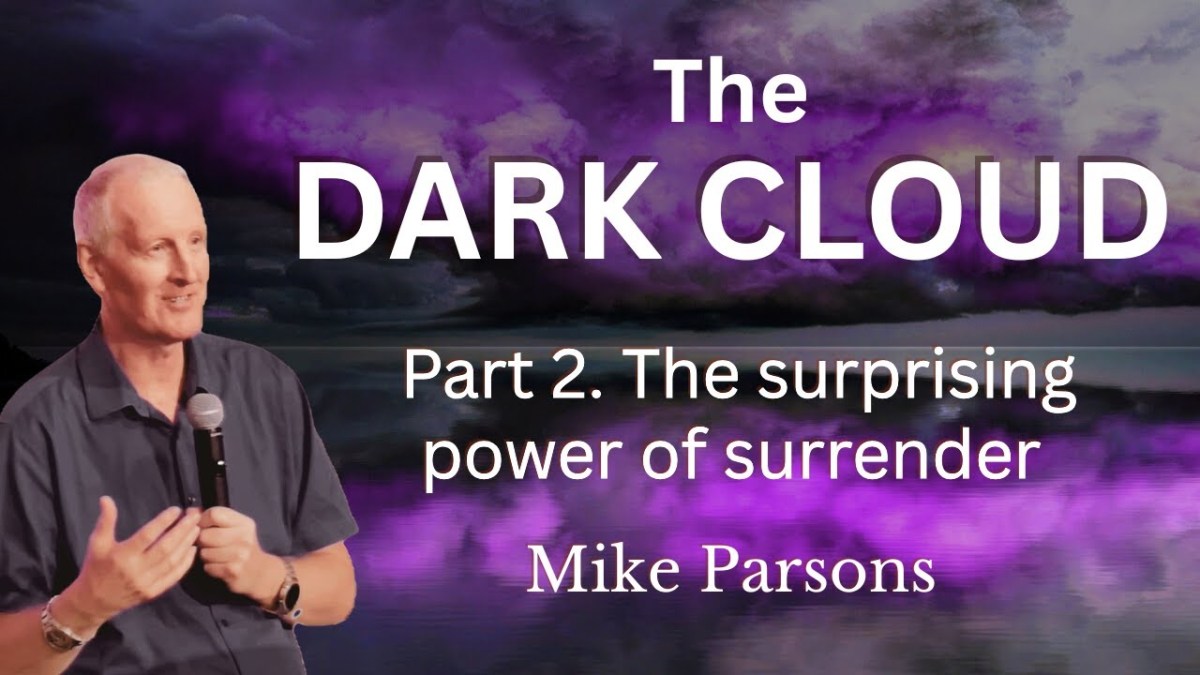Mike Parsons –
If you do not see the video, please click here.
God does not want to keep us at a distance. He wants us to be safe and secure in His presence—but that requires transformation.
Of course, Jesus wanted to share many things with His disciples, just as the Father desires to reveal amazing things to us. But we may not yet be ready to experience them. In John 16:12, Jesus said, “I have many more things to say to you, but you cannot bear them now.” That was certainly true for me. God wanted to reveal so much, and eventually He did, but at the time I simply could not bear it.
There is revelation, truth, and encounter available to us—but, like the disciples, we may not be ready. It is not because we are unworthy or not good enough, but because our minds need renewing. There are still things in our souls that need to be dealt with so that we learn to trust God—not based on what we see or understand—but simply because He is God. Our relationship with Him must be based on who He is, not on what He does for us, nor on what we do for Him.
Visiting or Dwelling?
God prepares us to dwell with Him in face-to-face intimacy—not just to visit from time to time. At one stage, I was visiting His presence. I was engaging with the realms of heaven, but I was not able to engage with His person—at least, not until I had been through this process.
My encounters in the dark cloud were preparing me for what was to come, though I was completely unaware of that at the time. I did not know what He was doing, or what He was going to do. I thought I had experienced everything there was to experience—how wrong I was!
Once, during one of those dark cloud encounters, I saw my destiny scroll. There was an event marked on it by a blue flame. The Father called it the eternal flame. I was deeply curious—why was I being shown this? At the time, I had no idea it would relate to what I was about to walk through. I saw my life flash before me, leading up to that moment within the flame. I just knew that nothing would ever be the same again. But I did not know what it meant, or how it would unfold. God was showing me something important, something intriguing—an invitation. And, as I sometimes say, Jehovah Sneaky knew I would not be able to resist.
He did not tell me what He was going to do—He simply invited me to engage the eternal flame for a life-changing experience. A friend of mine later painted a picture of someone in a blue flame. When I saw it, it resonated so strongly—it felt as though she had painted me, right there in the midst of that flame that had changed my life.

True Identity and Redemptive Gifts
As part of that process, the Father wanted to reveal my true identity to me—an identity closely linked to my redemptive gift. That redemptive gift is how the Father has wired me, as a son, to engage with the world around me and to mature into His fullness. It is how I see, perceive, and interact with life.
My true identity is connected to my redemptive gift, but it needed to be freed from the performance-based, soul-driven tendencies that had developed through my life experiences. Trauma, nurture, and upbringing can all shape how that gift functions—often making it impure.
In my case, I was using my redemptive gift to create and validate my identity. My redemptive gift is prophet–teacher. That is not the same as the spiritual gift of prophecy. This kind of “prophet” describes how I perceive and process the world. And I am almost equally prophet and teacher—every redemptive gift survey I have done reflects that. That is how God wired me to function as a son: curious about how things work, with the ability to explain them to others. That is probably why He chose me to be a forerunner in heavenly engagement—to open up that realm for others. Hopefully I can share my experiences in a way that is not too weird, so that people can see what is available to them too.
But I had gained my identity and security from the knowledge I received by doing that. I was using my soul to engage heaven—to see and know what the Father was doing, which in itself is good. But my soul would not allow my spirit to engage heaven on its own. Though we are seated in heavenly places, the consciousness of my soul was limiting my spirit’s ability to dwell and remain there. I was tethered to myself, and to the earth.
The Surrender of Self
So the essence of who I was, redemptively, was being used to create a false identity—and to bring me security and independence from my spirit. What I discovered was that me, myself, and I had to surrender. My soul and spirit had to be separated so that they could be reintegrated into oneness—spirit, soul, and body—joined and one with God. From His perspective, we are already one with Him.
As it says in 1 Corinthians 6:17,19-20: “But the one who joins himself to the Lord is one spirit with Him. Do you not know that your body is a temple of the Holy Spirit who is in you, whom you have from God, and that you are not your own? For you have been bought with a price: therefore glorify God in your body.”
This is what God desires: union so complete that we are one. But I could not experience that union—because my soul would not allow it. In my own understanding, I was alienated.
The Mirror Bible puts it beautifully:
“In our union with Him, we are one spirit with the Lord. Do you not realise that your body, by design, is the sacred shrine of the Spirit of God echoing within you? You are not the sole owner of your life—you are bought and paid for. All of you is His. Live your life conscious of how irreplaceably priceless you are. You host God in your skin.”
Gifted by Design, Not Performance
God wants to free us from the need for our soul to find identity in works—what the Bible calls the tree of the knowledge of good and evil, the path most of the world is on.
The purity of who we are redemptively must be tested and refined by fire. I believe our redemptive gifts will grow beyond just one or two, eventually reflecting all seven—to become more like Jesus. As the fruit of the Spirit matures in us, we will function more fully as sons—engaging not just in one way, but in every way.
The redemptive gifts listed in Romans 12:6–8 are prophet, servant, teacher, exhorter, giver, ruler, and mercy. These are not spiritual gifts for ministry. They are who we are. We are God’s gift to the world. The refining process reveals those gifts and frees us from the need to earn our identity through our own works. We can finally be who God intended—no longer performance-driven, trying to earn His favour.
That testing will look different for each of us. When I first studied redemptive gifts—through the teaching of Arthur Burk—I began to see how God uses testing to purify each one. When I taught on the ketubah in church, I warned people: If you go down this road, you will be tested.
I knew ruler-gift and servant-gift friends who had their ability to rule or serve removed—just like that. Then they had to face the question: Who am I without that? Who was I, without being able to see, understand, and teach?God was trying to show me: I am not who I am because of what I do, but because of who He made me to be. Even if I never did any of those things again, I would still be who I am.
A Restoration of Original Design
God took me through the dark cloud because He loves me.
He wanted to restore me to my original condition—so that I would know myself as He made me.
He wanted to bless me fully.
He wanted to reveal my heavenly identity and position as a son.
He wanted to release me into the fullness of sonship authority to engage creation.
But to do that, He had to do something quite drastic -it may be easier for you than it was for me.
All Mike’s books, including Into the Dark Cloud and Unconditional Love, are available to order from online and local booksellers; or you can buy the ebooks and download them instantly from our website.
More info at eg.freedomarc.org/books
Activation: Resting in Unconditional Love
I encourage you to just close your eyes.
Get relaxed.
You may want to lie down.
You can relax your body.
Begin by focusing on your breathing.
Breathe in slowly… and hold it…
Then breathe it out… slowly.
And as you breathe in… and breathe out…
Start to focus your thinking on God the Father, who is love.
As you begin to breathe in,
You are breathing in unconditional love—
The love of the Father for you,
As a son,
As a daughter,
As His child.
Breathe it in.
As you do, that unconditional love begins to flow
Through your whole being—
Touching every cell of your body,
Your mind,
Your emotions,
The whole of your soul, spirit, and body.
Let yourself be still,
And let God love on you.
Let Him show you how much He loves you.
As His love fills you,
Joy and peace come—
They overwhelm you,
They cocoon you.
All of His being begins to flow in you.
An atmosphere forms around you—
A cocoon of love, joy, and peace.
You are just resting in it.
Relaxing in it.
Be still.
Wait.
Rest.
Wait expectantly.
Whatever God wants to do with you—right now—
This is a safe place.
You can get out of the boat—figuratively.
You can choose to abandon yourself,
To sink into that vast ocean of unconditional love,
Where God’s love is so strong, so powerful—
You can trust Him.
He is a good God,
And He wants the best for you.
Just go deeper and deeper into that love
As He restores first love to you.
You can sink deeper…
And deeper…
There may be things around you that you sense or feel.
Be willing to go deeper and deeper…
Into love.






















